Dibyajyoti Sarma's Blog, page 8
January 18, 2022
Ranjana Kaul reviews My Other Half, Krishna Paul (Conver...
Ranjana Kaul reviews My Other Half, Krishna Paul (Conversations with Chandana Dutta), along with Joginder Paul (Monograph/MAKERS OF INDIAN LITERATURE SERIES) by Chandana Dutta and Abu Zahir Rabbani in The Beacon.
/
While the monograph provides a detailed and informative look at the works, themes and varied literary concerns animating Paul’s fiction, it is Chandana Dutta’s narrative recreation of conversations with Krishna Paul, My Other Half, which goes beyond a normative engagement with the writer’s oeuvre to provide an unexpectedly intimate and engaging glimpse into his life and work. It is written from the unique point of view of someone who shared the writer’s life, as a supportive but critically aware individual who did not always agree with the author’s literary and life choices.
/
Read the complete review here.
January 17, 2022
Basudhara Roy reviews The Wild Weed: Selected Poems by Pa...
Basudhara Roy reviews The Wild Weed: Selected Poems by Paul Kaur, translated by Arvinder Kaur in The Wire.
/
These 65 poems in The Wild Weed have been edited and translated from the original Punjabi by Arvinder Kaur with such skill, emotive intimacy and poetic empathy that reincarnating into the form of the target language, they hardly read like translations. There is no fuzziness, no uncertainty, no brittleness or lack of lustre. As soon as one is touched by the book’s gracefulness, the knowledge that these verses were reborn in another language is conveniently and completely forgotten. The reader swims through the collection with complete confidence and fulfilment, grateful that no meaning has been lost.
/
Read the complete review here.
January 16, 2022
The book this week recommended by Dibyajyoti Sarma is Ume...
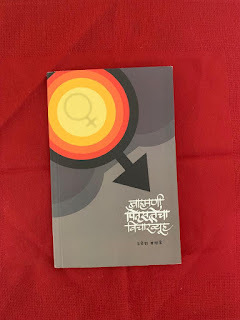 The book this week recommended by Dibyajyoti Sarma is Umesh Bagade’s Brahmani Pitrusattecha Vicharvyuh, a treaty on the Brahminical patriarchy
The book this week recommended by Dibyajyoti Sarma is Umesh Bagade’s Brahmani Pitrusattecha Vicharvyuh, a treaty on the Brahminical patriarchy
Published by Lokvangmay Gruha; printed at Anjum Binding Works, Mumbai
The book this week recommended by Dibyajyoti Sarma is Nab...
The book this week recommended by Dibyajyoti Sarma is Nabarun Bhattacharya’s Herbert, translated from the Bengali by Sunandini Banerjee
 Published by Seagull Books; Typeset by Seagull Books; printed at Hyam Enterprises, Calcutta
Published by Seagull Books; Typeset by Seagull Books; printed at Hyam Enterprises, Calcutta
December 18, 2021
Red River WINTER SALE Offer Purchase any of the following...
 Red River WINTER SALE Offer
Red River WINTER SALE Offer Purchase any of the following five titles for just Rs 1,000 (+ Rs 60 shipping)
Write to Papyrus Book Store at papyrusthebookstore@gmail.com,
Or call 9769449694
Offer valid until 29 December 2021, or till stocks last
1. Sea Glass by Kavita Ratna
2 Stitching a Home by Basudhara Roy
3. A Marginally Better Place by Naren Weiss
4. I'd Like a Bit of the Moon by Rati Agnihotri
5. Being Non-Essential by Madhu Raghavendra
6. Defiance Came Naturally To Me by Sheena Lakshmi
7. After Grief by Shikhandin
8. The Fern-Gatherer's Association by Sekhar Banerjee
9. Paradise isn’t Artificial by Hoshang Merchant
10. Principle of Sleep by Bibhu Padhi
This week, Dibyajyoti Sarma recommends the eclectic writi...
This week, Dibyajyoti Sarma recommends the eclectic writings of Alberto Manguel, the Argentine-Canadian anthologist, translator, essayist, novelist, editor, and a former Director of the National Library of Argentina.
He is the author of numerous non-fiction books such as The Dictionary of Imaginary Places (co-written with Gianni Guadalupi in 1980), A History of Reading (1996), The Library at Night (2007) and Homer's Iliad and Odyssey: A Biography (2008); and novels such as News From a Foreign Country Came (1991). Though almost all of Manguel's books were written in English, two of his novels (El regreso and Todos los hombres son mentirosos) were written in Spanish, and El regreso has not yet been published in English.
Nabanita Sengupta in conversation with Sekhar Banerjee, t...
Nabanita Sengupta in conversation with Sekhar Banerjee, the author of THE FERN-GATHERER'S ASSOCIATION in Saaranga Magazine.
/
Now there is a craze for ‘ecopoetics’. But poetry is and always will remain dependent on our ecosystem and our immediate environment as long as we are organic beings and not straight-jacketed into some economy driven philosophy of life. Light posts might have replaced trees and multistoried buildings might have replaced the singular home and metaphors and similes might have changed accordingly, but our raw emotions as human beings remain the same in all places alike. That’s why poetry is universal.
/
Read the full interview here.
The book this week recommended by Dibyajyoti Sarma is Ind...
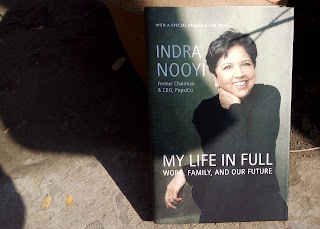 The book this week recommended by Dibyajyoti Sarma is Indra Nooyi’s My Life in Full: Work Family and Our Future
The book this week recommended by Dibyajyoti Sarma is Indra Nooyi’s My Life in Full: Work Family and Our Future
Published by Hachette India; Typeset in Bembo Std by InoSoft Systems; printed at Manipal Technologies
December 8, 2021
Vedamini Vikram reviews WITNESS: The Red River Book of th...
Vedamini Vikram reviews WITNESS: The Red River Book of the Poetry of Dissent, edited by Nabina Das in the November issues of Teesta Review: A Journal of Poetry.
/
“The poems cover several takes on dissent, such as, empathy and sisterhood against ideas of animosity between women; limitations of poetry; questioning writing as well as hegemony of writers; freely expressing violent anger as opposed to a muffled and censored response; redefining limits of poetry as a form by fusing art into it (as seen in Maaz Bin Bilal’s poem in which the words beautifully take on the shape of a mosque); and using swear words, graphic imagery and sexual tropes as opposed to seeing language as a pristine arena. The cover of the book itself is in perfect harmony with the content inside. The front cover displays a freckled, big red dot, representing a scattered whole. The back cover consists of 250 words that capture the variety of definitions of dissent that the book has to offer.
/
Read the full review here. http://www.teestajournal.com/p/rev-3-...
December 7, 2021
Excited to receive the news that Nilamani Phookan has bee...
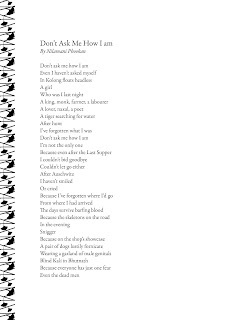
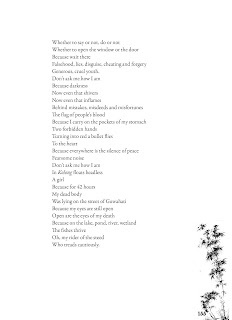
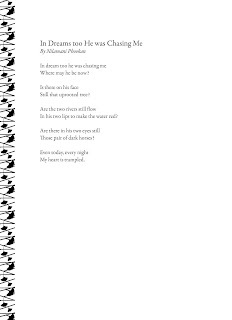
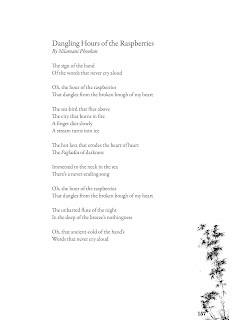
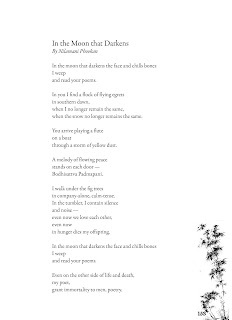 Excited to receive the news that Nilamani Phookan has been chosen for the 56th Jnanpith Award — a Jnanpith for Assamese poetry! Imagine. And about time too. And after 20 long years since Mamoni Raisom Goswami won the second Jnanpith for Assamese literature in 2000 (the first was Birendra Kumar Bhattacharya in 1979).
Excited to receive the news that Nilamani Phookan has been chosen for the 56th Jnanpith Award — a Jnanpith for Assamese poetry! Imagine. And about time too. And after 20 long years since Mamoni Raisom Goswami won the second Jnanpith for Assamese literature in 2000 (the first was Birendra Kumar Bhattacharya in 1979). To celebrate the achievement, here’s four poems by Nilamani Phookan that I translated a long time ago.
/
Considered to be the foremost modernist poet in modern Assamese poetry, the hallmark of Nilamani Phookan’s poetry is condensed themes expressed in economy of words. His collection of poems Golapi Jamur Lagna (Hour of the Raspberries) is considered to be a milestone which inspired a generation of poets. The density of theme makes it almost impossible to translate and paraphrase his poetry. He received the Sahitya Akademi awards in 1982 and Padmashree in 1990. His other volumes of poetry include Surya Heno Nami Ahe Ei Nadiyedi (The sun is said to descend by this river, 1963), Nirjanatar Sabda (Words of Solitude, 1965), Phuli Thaka Suryamukhi Phultor Pine (Towards the Blooming Sunflower, 1971), Nrityarata Prithibi (Dancing Earth, 1985), and Kabita (Poems, 2001). He has also translated into Assamese a collection of Japanese poetry, and also the poems of Spanish poet Federico Garcia Lorca. He worked as a teacher of history in a college in Guwahati.
/
In the Moon that Darkens
By Nilamani Phookan
In the moon that darkens the face and chills bones
I weep
and read your poems.
In you I find a flock of flying egrets
in southern dawn,
when I no longer remain the same,
when the snow no longer remains the same.
You arrive playing a flute
on a boat
through a storm of yellow dust.
A melody of flowing peace
stands on each door —
Bodhisattva Padmapani.
I walk under the fig trees
in company-alone, calm-tense.
In the tumbler, I contain silence
and noise —
even now we love each other,
even now
in hunger dies my offspring.
In the moon that darkens the face and chills bones
I weep
and read your poems.
Even on the other side of life and death,
my poet,
grant immortality to men, poetry.
Don’t Ask Me How I am
By Nilamani Phookan
Don’t ask me how I am
Even I haven’t asked myself
In Kolong floats headless
A girl
Who was I last night
A king, monk, farmer, a labourer
A lover, naxal, a poet
A tiger searching for water
After hunt
I’ve forgotten what I was
Don’t ask me how I am
I’m not the only one
Because even after the Last Supper
I couldn’t bid goodbye
Couldn’t let go either
After Auschwitz
I haven’t smiled
Or cried
Because I’ve forgotten where I’d go
From where I had arrived
The days survive barfing blood
Because the skeletons on the road
In the evening
Snigger
Because on the shop’s showcase
A pair of dogs lustily fornicate
Wearing a garland of male genitals
Blind Kali in Bhutnath
Because everyone has just one fear
Even the dead men
Whether to say or not, do or not
Whether to open the window or the door
Because wait there
Falsehood, lies, disguise, cheating and forgery
Generous, cruel youth.
Don’t ask me how I am
Because darkness
Now even that shivers
Now even that inflames
Behind mistakes, misdeeds and misfortunes
The flag of people’s blood
Because I carry on the pockets of my stomach
Two forbidden hands
Turning into red a bullet flies
To the heart
Because everywhere is the silence of peace
Fearsome noise
Don’t ask me how I am
In Kolong floats headless
A girl
Because for 42 hours
My dead body
Was lying on the street of Guwahati
Because my eyes are still open
Open are the eyes of my death
Because on the lake, pond, river, wetland
The fishes thrive
Oh, my rider of the steed
Who treads cautiously.
In Dreams too He was Chasing Me
By Nilamani Phookan
In dream too he was chasing me
Where may he be now?
Is there on his face
Still that uprooted tree?
Are the two rivers still flow
In his two lips to make the water red?
Are there in his two eyes still
Those pair of dark horses?
Even today, every night
My heart is trampled.
Dangling Hours of the Raspberries
By Nilamani Phookan
The sign of the hand
Of the words that never cry aloud
Oh, the hour of the raspberries
That dangles from the broken bough of my heart
The sea-bird that flies above
The city that burns in fire
A finger dies slowly
A stream turns into ice
The hot lava that erodes the heart of heart
The Pagladia of darkness
Immersed to the neck in the sea
There’s a never-ending song
Oh, the hour of the raspberries
That dangles from the broken bough of my heart
The unbarred flute of the night
In the deep of the breeze’s nothingness
Oh, that ancient-cold of the hand’s
Words that never cry aloud
/



